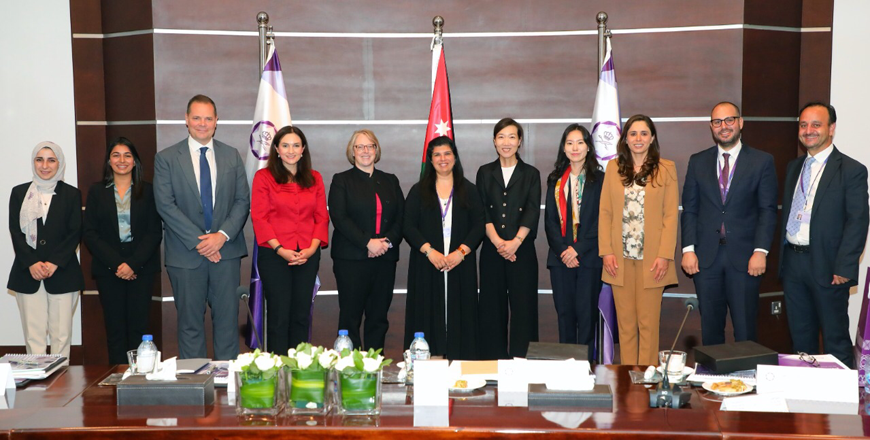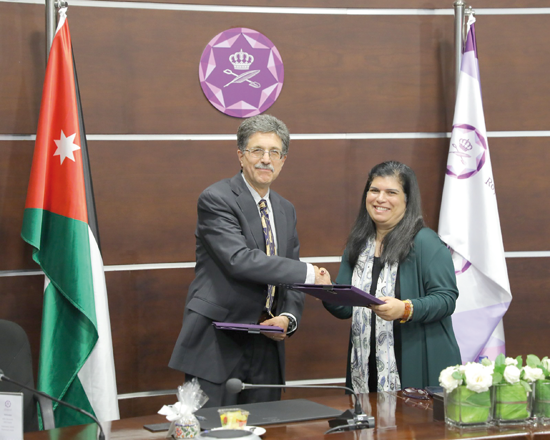You are here
RSS inaugurates Chemical, Biological, Radiological and Nuclear Threat Office
By JT - Sep 22,2022 - Last updated at Sep 22,2022

HRH Princess Sumaya and members of foreign delegations pose for a group photo at the CBRN Threat Office (Photo courtesy of RSS)
AMMAN — The Royal Scientific Society (RSS) established a Chemical, Biological, Radiological and Nuclear (CBRN) Threat Office whose mission is to promote scientific and technical collaboration in the CBRN field.
Through the development, facilitation, and implementation of impactful programming, the CBRN Threat Office works with national, regional, and international partners from government and nongovernmental organisations to promote research and best practices in CBRN risk mitigation, according to a RSS statement.
On Monday, September 12, 2022, with the participation of HRH Princess Sumaya, the CBRN Threat Office held its first Advisory Board meeting by hosting high-level delegations from the United States Department of Energy (DOE) and Sandia National Laboratories, the Organisation for the Prohibition of Chemical Weapons and South Korea’s Institute of Nuclear Non-Proliferation and Control (KINAC).
The members of the Advisory Board first met Jordan’s national stakeholders representing different government, military, and nonprofit organisations to learn more about the CBRN Threat Office’s five-year strategic plan and to identify mechanisms to collaborate on programming that will advance the application of CBRN sciences and related technologies that match the government’s safety and security priorities.
The activities of the CBRN Threat Office will focus on identifying and mitigating the CBRN risks threatening the region’s communities through developing comprehensive safety and security strategies underpinned by legislative, human and physical infrastructure to build healthier and more secure communities capable of facing upcoming challenges, the statement said.
The CBRN Threat Office further updated the Advisory Board on a number of ongoing professional development activities for the government and public institutions related to first responders, border security, human reliability, risk mitigation and the removal and replacement of Cesium-based blood irradiator sources with safer X-ray-based alternative technology.
Furthermore, upcoming projects in public health (bio-safety and bio-security, refugees and migration), nuclear security and non-proliferation (arms control, nuclear safety and security, illicit trafficking), energy and climate security (climate security and nuclear energy), and disruptive technologies (machine learning, tracking databases, digital image processing, cyber security) were presented and discussed.
Nisreen Al Hmoud, the director of the Bio-Safety and Bio-Security Centre at RSS that houses the CBRN Threat Office, said: “The members of our Advisory Board represent the most advanced international institutions operating in the CBRN field. The positive feedback and their support to expand our work together means that we will continue to have the tools, expertise, and insight needed to maximise the impact and sustainability of our programming in support of the safety and security of our country.”
Following the Advisory Board meetings, the DOE and KINAC delegations were hosted by Khaled Toukan, Samer Kahook, and Ahmad Alsabbagh at the Jordan Atomic Energy Commission (JAEC), the Jordan Research and Training Reactor (JRTR), and the Synchrotron-light for Experimental Science and Applications in the Middle East.
During their visit to JAEC, the delegations received updates on recent advances in Jordan’s nuclear energy programme, JAEC’s efforts to secure and replace Cesium-based blood irradiator sources and the work that it carries out to analyse radioactive samples, treat radioactive waste, and calibrate radiation-producing machines throughout the country.
At JRTR, Samer Kahook presented the extensive efforts that have been undertaken to develop the human resources needed not only to operate the JRTR, but to ensure a safe and secure environment for running a state-of-the-art, multipurpose, advanced nuclear research complex. Representatives from JAEC and JRTR highlighted the valuable outputs from ongoing collaboration with the Royal Scientific Society and the CBRN Threat Office.
On the final day of their visit, the DOE delegation was hosted by the Energy and Minerals Regulatory Commission (EMRC) and the National Centre for Nuclear and Radiological Security (NCNRS) where the Director of the NCNRS, Samer Quran, and the director of the Nuclear security at the EMRC, Luai Kiswani, briefed the DOE delegation on their advanced technical capabilities used to strengthen the national nuclear security system and measures and the successful joint projects that were accomplished by the EMRC and the RSS in the field of preparing training curriculum, programmes and conducting training events at the national and regional levels.
Among these, EMRC noted the impact that the Radiation Detection Training Centre delivered in terms of capacity building, border security, and ensuring security and safety in Jordan, a true partnership EMRC and the RSS represented by CBRN Threat Office.
Related Articles
AMMAN — The National Centre for Nuclear and Radiological Security (NCNRS) and Octopian Services Jordan on Tuesday signed a memorandum of und
The EU on Tuesday unveiled a 3.9 million euro project to strengthen the capacities of the relevant authorities in Jordan, Iraq and Lebanon in dealing with chemical, biological, radiological and nuclear (CBRN) hazards.
AMMAN — HRH Princess Sumaya, president of the Royal Scientific Society (RSS), on Sunday attended the second meeting of the Advisory Board of

















